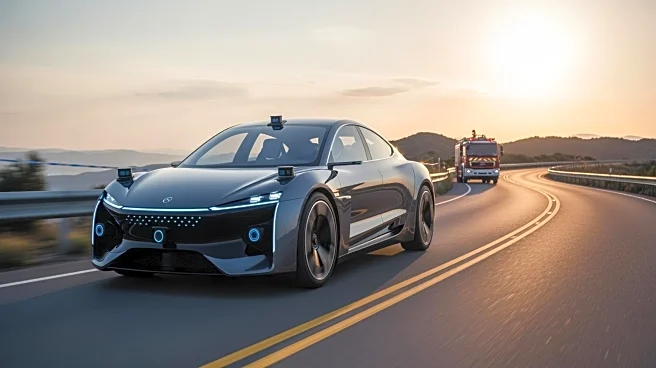What's Happening?
Tesla has rolled out version 14 of its Full Self-Driving (FSD) software, introducing significant improvements over the previous version. The update, which has been gradually released to the public, addresses
several issues reported by users, such as brake-stabbing and lane behavior. Notable enhancements include better lane switching on highways, increased awareness of merging traffic, and improved object avoidance. The software now exhibits more courteous driving behavior, such as allowing cars to merge and avoiding obstacles like animal carcasses. Additionally, Tesla has removed the 'Max Speed' setting, making speed adjustments more intuitive for users.
Why It's Important?
The improvements in Tesla's FSD software are crucial as they enhance the safety and reliability of semi-autonomous driving. By addressing previous issues and refining the software's performance, Tesla is moving closer to achieving fully autonomous driving capabilities. This development is significant for the automotive industry, as it sets a benchmark for other manufacturers in the race towards autonomous vehicles. The enhancements also have implications for public safety, as more reliable self-driving technology could reduce traffic accidents caused by human error. Furthermore, the advancements may influence regulatory discussions around the deployment of autonomous vehicles on public roads.
What's Next?
As Tesla continues to refine its FSD software, further updates are expected to enhance its capabilities. The company may focus on expanding the software's availability to more users and regions, pending regulatory approvals. Stakeholders, including regulators and competitors, will likely monitor Tesla's progress closely, as the success of FSD could impact the broader adoption of autonomous driving technology. Additionally, Tesla's advancements may prompt other automakers to accelerate their own autonomous vehicle development efforts.
Beyond the Headlines
The ethical and legal implications of autonomous driving technology remain a topic of debate. As Tesla's FSD software becomes more advanced, questions about liability in the event of accidents and the ethical programming of decision-making algorithms will need to be addressed. The cultural shift towards accepting autonomous vehicles will also play a role in their widespread adoption, as public trust in the technology is essential for its success.









